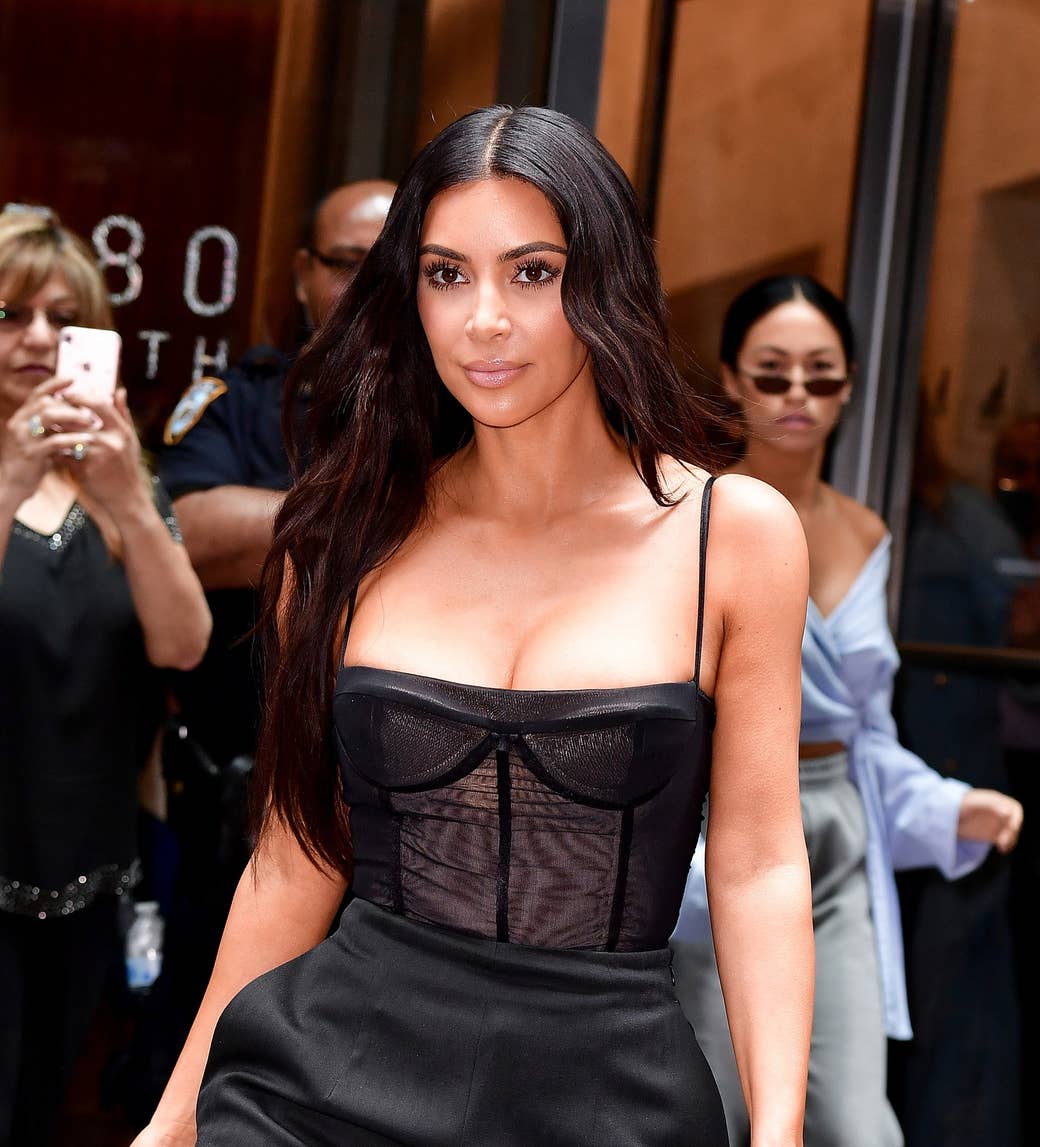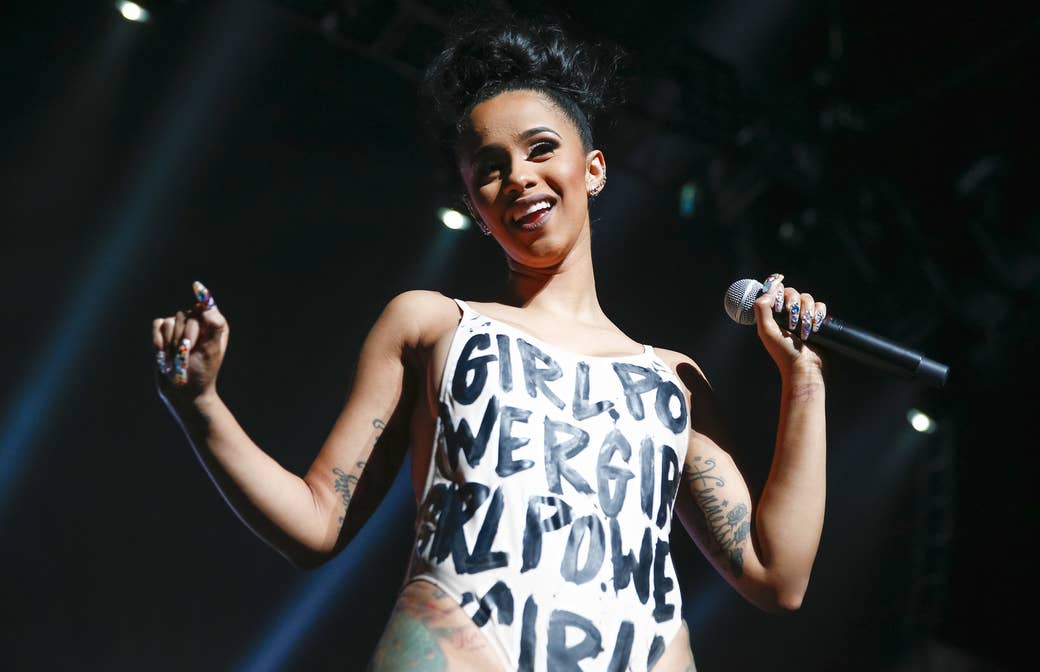
The internet is a capricious beast; someone can go from deified to vilified in a matter of minutes. Kim Kardashian and rapper Cardi B, whose single “Bodak Yellow” just made the Billboard Top 10, are the latest examples of how internet-shaming can both inform and disempower, and how the same societal forces that give a celebrity like Kim Kardashian so much influence can cripple black and brown celebrities who commit similar faux pas.
On Aug. 14, Kim Kardashian recorded a Snapchat video admonishing her fans for criticizing makeup artist Jeffree Star, who has gotten in trouble for making racist remarks in the past: “I get [that] it's a serious deal if you say racial things, but I do believe in people changing, and people that apologize; I will give them the benefit of the doubt and accept that people change and move on." Her video prompted a quick outcry as black Twitter users chided Kardashian for assuming she had the authority to tell black people what racist comments they should get over. She followed up with an apology video the following day. “I don’t really feel like I have the right to speak on that.” She continued, “I just feel a bit naive, and I do want to really apologize for me feeling like I had the right to say ‘get over it’ in a situation that involves racism.” The apology may have been sincere but it also felt like a quick attempt to save her brand from a full-on marketing crisis in the wake of heightened racial tensions in the US. The situation with Kardashian was in stark contrast with that of Cardi B, another recent victim of public-shaming.
On Aug. 10, Cardi B released one of her now-notorious on-camera monologues on Twitter about her growing stardom: “I just want to say thank you to everybody that has seen me blossom into a butterfly, you know what I’m saying. I went from a roach to a butterfly.” In a tweet thread that has since been deleted, a user who goes by the handle @WokeMutant accused Cardi B of displaying colorism with those remarks, suggesting that Cardi, who is of Afro-Latinx descent, was demonizing black people with darker skin tones by using the term “roach.” Other Twitter users quickly piled on: “Well it's official Cardi B is cancelled. It was fun while it lasted,” tweeted one user. "Cardi B was/is my girl,” tweeted another user accompanied with the iconic “I was rooting for you!” America’s Next Top Model gif. Some claimed to have always known that Cardi B was problematic: “I told mfs that Cardi B is a colorist transphobic. We been told y’all!” And a number of people were saying she was canceled, or someone who deserves their public platform to be taken away: “Cardi B is a fucking mess. I was rooting for her ass all along. Cancelled!”
Shortly afterward, anti-trans comments Cardi B made in an Instagram video in November 2016 (since deleted), began to resurface. In the video, Cardi narrates how she would get revenge on her partner for cheating by enticing him to participate in a threesome with herself and a trans woman under the pretense that he would be sleeping with two cis women. The video was anti-trans for two reasons: She perpetuated the idea that there is something wrong with sleeping with a trans woman and she used a trans person as a prop for petty, cis-normative revenge that only assists in the dehumanization of trans people. She has since apologized for this video and her usage of the T-word slur.
But the speed with which various folks criticized Cardi B and described her as “canceled” wasn’t just an example of internet whimsy and attendant backlash. The black and brown Twitter avatars coming after Cardi were particularly upset, because these same people placed Cardi B on a sex-positive, pro-black, feminist pedestal — not because of her work or her continued advocacy — but because politicizing pop culture is currently profitable and trendy. This often proves to be dangerous and regrettable. The need to overintellectualize celebrities demeans and transforms them into political props. They become static, flawless icons for political identities and once they prove the limits of their knowledge, or simply show their humanity, we rid ourselves of them — and notably redemption is reserved for only the most powerful (and white) celebrities.

Cardi B’s first claim to fame was as a no-holds-barred truth-teller. In August 2016, Latina magazine featured Cardi as a woman crushing the patriarchy. When asked if she identified as a feminist, she responded, “I think so. I support every type of woman. A lot of people claim they are feminists, but they only support a certain type of woman: only doctors, nurses, career women. I support women getting money, regardless.” A couple of months later, Cardi B graced the cover of Vibe Viva, the Latinx edition of the hip-hop magazine, with the words: “homegirl, gangsta b*tch, and “feminist” plastered under her name. “She may well be a social media mainstay with all the nuts and bolts of a superstar, but the television personality-turned-rapper is the quintessential homegirl from around the way many of us know and love,” wrote reporter Marjua Estevez. “She’s also the self-described stripper hoe that’s all about her shmoney; the intersectional feminist who advises her cypher of girlfriends on how to turn the tables on ain’t sh*t f**k boys; the gangsta b***h who warns detractors not to underestimate her.” However, the description of Cardi as a feminist sparked a backlash among readers, but many publications came to her defense: "Cardi B Just Shut Your Elitist Misconceptions About Feminism The Fuck Down," argued Paper magazine. “Cardi B is a feminist and y’all can stay mad,” said Madame Noire.
The rush to turn Cardi into a feminist icon continued unabated. Take Shop Blk’s shirt, which came out in early 2017 and has the names Coretta & Cardi B emblazoned in the front. While meant to be tongue-in-cheek, the shirt makes a false equivalency between Cardi and Coretta Scott King. Just because Cardi rails against slut-shaming doesn’t make her a civil rights icon. Juxtapositions like this only make it easier for folks to vilify Cardi when she fails to meet these high standards. And when the person at the center of all that praise fails, like they inevitably do, there is no room for growth or forgiveness — just disposal.
The result is that when these critiques happen, they fall on deaf ears. If the person apologizes, it is not sincere. If they do not apologize, they are horrid people. And if the goal of these social media attacks is to elevate the consciousness of another human being, perhaps it is time we think about adopting a better practice of critique and accountability, if that is truly what we are interested in. Let’s do something that works. There is a difference between what is righteous and what is productive. We can acknowledge that people being offended by an offensive statement is right, but if you are interested in transforming the person that delivered the statement, thousands of people attacking someone in public will rarely get this done. The question is are we interested in performing rage on the internet or creating justice and accountability through real-life pedagogical moments?
In the age of the internet, accountability can’t happen in public. Take musician Azealia Banks, chef The Kitchenista, or the novelist Chimamanda Adichie, for example, or the plethora of other black people, often femme or women, who have been "canceled" by digital lynch mobs and seemingly never able to be redeemed. For critique to be effective it must happen in a space that is promoting growth, not humiliation. But when celebrities are given the opportunity to apologize, tellingly it’s mainly white celebrities who are given the benefit of the doubt. Kim Kardashian’s apology went live Tuesday afternoon and was immediately written up in People and Us Weekly. In some ways, she’s gained even more attention for saying sorry than she did for the original sin.
Celebrity and non-celebrity black women or femmes who fail in public do not have the same access or control over mainstream publications once they mess up, and the scars of their transgressions last longer, making redemption all the more difficult. Azealia Banks has been banned from Twitter for racist remarks, for example, while Twitter still refuses to take reports of harassment from women and people of color seriously. The risk levels are different for black, lesser known celebrities. If Kim Kardashian were to lose her black audience, she would still have a monstrous mega-brand. If Cardi B were to lose her black audience, her career would be effectively over.
If helping Cardi B transcend this problematic moment was the goal, the way we critique her must be examined. It must happen at a pace at which people can hear, not people heralding judgments at a feverish rate. At the speed and amount Cardi B was receiving reactions, there was no way for her to reflect on even the most thoughtful critiques.
The truth is nobody is listening to Cardi B’s “Bodak Yellow” because it is a pro-black, queer, feminist anthem. We are listening to it because it knocks. It is nice when our artists can be our political favorites, but it isn’t necessary to enjoy the work.
We push celebrities (and everyday people with large social media followings) to political pedestals and watch them fall while hiding our hands, failing to acknowledge how complicit we are in their very public failings.
Only once we stop using black people as marketing and branding tools can we begin to engage black people as human — messy, problematic, flawed humans. Cardi B is a hot mess, and the mess belongs to many people. Namely, herself and all the people that positioned her as an icon, instead of the regular shmegular girl she proclaimed and displayed herself to be in the infancy of her public career. And those same people should be running to clean her up and not burn her alive. ●
Myles E. Johnson is a writer and author of children's book, Large Fears. He cares about all the places pop culture, politics, black feminism, queer theory, and red wine meet.
